The program, initiated by the government in 2010, laid out 19 criteria on socio-economic development, politics, and defense, aiming to enhance the development in rural regions of Vietnam. The list of criteria includes the development of infrastructure, the improvement of production capacity, environmental protection, and the promotion of cultural values.
To date, the entire nation now has 3,542 communes that meet the standards of new-style rural areas (or 39.7 percent of all communes nationwide). Meanwhile, 55 districts in 28 provinces and cities have received the prime minister’s accreditation for fulfilling all criteria and completing their assigned mission in new-style rural area building.
    |
 |
|
Photo: baovinhlong.com.vn |
According to Tien, the goal set for this year was to have 3,500 communes (or 39 percent of all communes) recognized as new-style rural areas and at least 54 districts obtaining the PM’s accreditation.
The official said the steering committee for the program will focus on directing localities to continue their measures and efforts next year in a bid to realize the National Assembly’s goal for the 2016-2020 period.
Talking about this year’s outcomes, Tien said many localities have increased resources, innovations, and quality guarantees by developing value chains in line with food safety standards and production restructuring.
Many of them intensified their work to tackle environmental pollution and came up with effective solutions to their accrued liabilities that had arisen from the program’s basic construction plans, he added.
Tien also pointed to a significant gap in building new-style rural areas among certain regions. While localities like Ho Chi Minh City, Da Nang, and Dong Nai have completed their set works and are now advancing into even further construction, others such as Dien Bien, Bac Kan, and Cao Bang have recorded very low numbers of communes that meet standards.
According to Tien, environmental pollution (especially water pollution) is getting worse in some areas, while food safety, despite the country’s progress in ensuring farm produce’s quality, remains a pressing issue.
Source: VNA